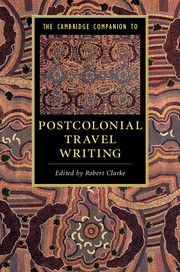Description
The Cambridge Companion to Postcolonial Travel Writing
Cambridge Companions to Literature Series
Coordinator: Clarke Robert
This Companion addresses an exciting emerging field of literary scholarship that charts the intersections of postcolonial studies and travel writing.
Language: English
The Cambridge Companion to Postcolonial Travel Writing
Publication date: 01-2018
286 p. · 15.1x22.8 cm · Paperback
Publication date: 01-2018
286 p. · 15.1x22.8 cm · Paperback
The Cambridge Companion to Postcolonial Travel Writing
Publication date: 01-2018
286 p. · 15.7x23.5 cm · Hardback
Publication date: 01-2018
286 p. · 15.7x23.5 cm · Hardback
Description
/li>Contents
/li>Biography
/li>
The Cambridge Companion to Postcolonial Travel Writing offers readers an insight into the scope and range of perspectives that one encounters in this field of writing. Encompassing a diverse range of texts and styles, performances and forms, postcolonial travel writing recounts journeys undertaken through places, cultures, and communities that are simultaneously living within, through, and after colonialism in its various guises. The Companion is organized into three parts. Part I, 'Departures', addresses key theoretical issues, topics, and themes. Part II, 'Performances', examines a range of conventional and emerging travel performances and styles in postcolonial travel writing. Part III, 'Peripheries' continues to shift the analysis of travel writing from the traditional focus on Eurocentric contexts. This Companion provides a comprehensive overview of developments in the field, appealing to students and teachers of travel writing and postcolonial studies.
1. Towards a genealogy of postcolonial travel writing: an introduction Robert Clarke; Part I. Departures: 2. Postcolonial travel writing and postcolonial theory Justin D. Edwards; 3. Walk this way: postcolonial travel writing of the environment Jill Didur; 4. History, memory, and trauma in postcolonial travel writing Robert Clarke; Part II. Performances: 5. Diasporic 'returnees' and imagined homelands Srilata Ravi; 6. Diplomats as postcolonial travellers Eva-Marie Kröller; 7. The metropolitan journeys of Francophone postcolonial travellers Charles Forsdick; 8. African American travel writing Tim Youngs; 9. Seeking the sacred in postcolonial travel writing Asha Sen; 10. Contemporary postcolonial journeys on the trails of colonial travellers Christopher Keirstead; Part III. Peripheries: 11. Postcolonial travel journalism and the new media Brian Creech; 12. Travel magazines and settler (post)colonialism Anna Johnston; 13. Refugee and asylum seeker narratives as travel writing April Shemak; 14. Travellers in postcolonial fiction Stephen M. Levin; 15. Afterword Mary Louise Pratt.
Robert Clarke is a Senior Lecturer in the English Studies Programme, School of Humanities, and Co-Director of the Centre for Colonialism and its Aftermath, University of Tasmania. He is the author of Travel Writing from Black Australia: Utopia, Melancholia, and Aboriginality (2016), and editor of Celebrity Colonialism: Fame, Power and Representation in Colonial and Postcolonial Cultures (Cambridge, 2009). He has been a guest editor for special issues on travel writing for Postcolonial Studies and Studies in Travel Writing.
© 2024 LAVOISIER S.A.S.
These books may interest you

Perspectives on Travel Writing 64.97 €




